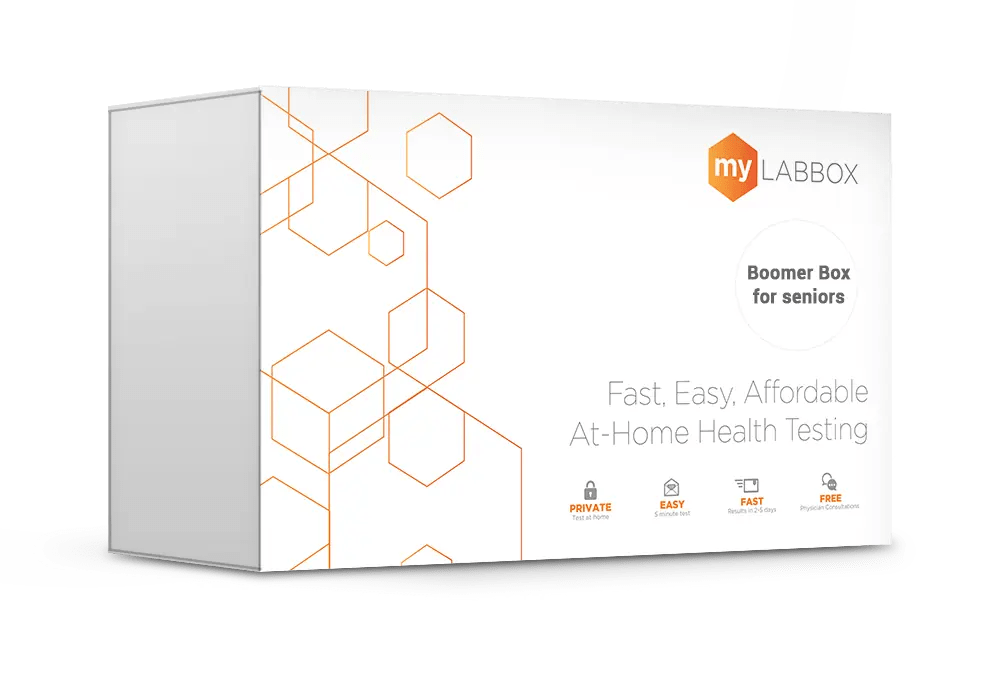Boomer Box: 5-panel STD test for seniors - At-home STD testing - myLAB Box (original) (raw)

Rated 5.00 out of 5 based on 2 customer ratings
Test for the most common STDs in older adults: Chlamydia, Gonorrhea, Hepatitis C, HIV I, and HIV II
- Fast results from the lab
- Free physician consultation for positives
- FSA/HSA cards accepted
- Free shipping on orders over $150
Temporarily unavailable in NY state.
Collection Methods: Finger prick, Urine collection
About the Boomer Box
New infections in seniors is now on par with young people ages 20-24. A few factors might contribute to the rise in STD rates, including public perception of healthcare discoveries made during the 1960s – a decade when many baby boomers came of age. Oral contraceptives – which protect against pregnancy, but not STDs – were gaining traction as a common birth control method, and advances in modern medicine made STDs seem treatable, rather than life-threatening.
Today’s seniors, who may find themselves suddenly back on the dating scene, have missed recent public education campaigns about the necessity of barrier contraceptives, such as condoms. People over the age of 60 report the lowest condom usage of any population.
Included are 1 mail-in urine collection kit and 1 finger-stick blood kit to test for the following infections: Ghlamydia (genital), Gonorrhea (genital), HIV I and II, and Hepatitis C.
Test for three (3) of the most common high-risk sexually transmitted infections (STIs) in seniors as well as Hepatitis C from the privacy of your own home with our myLAB Box at home STD test for seniors.
Hepatitis C
Hepatitis C virus (HCV) infection frequently occurs in older individuals, with a 40% prevalence in the “Baby Boomers” (born from 1945 to 1965). There are about three million Americans living with Hepatitis C. In many cases, the disease progresses to cirrhosis as well as liver cancer.
Most people who are recently infected with Hepatitis C do not have symptoms. Some people have yellowing of the skin (jaundice). Chronic infection often causes no symptoms. But fatigue, depression and other problems can occur.
Persons who have long-term (chronic) infection often have no symptoms until their liver becomes scarred (cirrhosis). Most people with this condition are ill and have many health problems.The following symptoms may occur with Hepatitis C infection: pain in the right upper abdomen, abdominal swelling due to fluid (ascites), clay-colored or pale stools, dark urine, fatigue, fever, itching, jaundice, loss of appetite, nausea and vomiting.
HIV and Older Adults
According to the Centers for Disease Control and Prevention (CDC),an estimated 47% of Americans living with diagnosed HIV were aged 50 and older. Many HIV risk factors are the same for adults of any age, but older people are less likely to get tested for HIV. Treatment with HIV medicines (called antiretroviral therapy or ART) is recommended for everyone living with HIV.
The number of older adults living with HIV is increasing for the following reasons:
- Many people diagnosed with HIV at a younger age are growing older. Life-long treatment with ART is helping these people live longer, healthier lives.
- Thousands of older people are newly diagnosed with HIV every year.
Many risk factors for HIV are the same for adults of any age. But like many younger people, older adults may not be aware of their HIV risk factors. In the United States, HIV is spread mainly by having anal or vaginal sex with someone who has HIV without using a condom or taking medicines to prevent or treat HIV or sharing injection drug equipment, such as needles, with someone who has HIV.
Some age-related factors can put older adults at risk for HIV infection. For example, age-related thinning and dryness of the vagina may increase the risk of HIV infection in older women. In addition, women who are no longer concerned about pregnancy may be less likely to use a condom during sex.
CDC recommends that everyone 13 to 64 years old get tested for HIV at least once as part of routine healthcare and that people at higher risk of infection get tested more often. Your health care provider may recommend HIV testing if you are over 64 and at risk for HIV infection.
Sexually Transmitted Diseases (STDs – Chlamydia and Gonorrhea)
Infection rates for sexually transmitted diseases keep climbing among Americans 45 and older, part of a larger national trend that the U.S. Centers for Disease Control and Prevention says must be confronted. There is about a 20 percent increase in these diseases, and continues a trend of year-over-year increases since at least 2012. The rates of infection are highest among people ages 15 to 24, but the increase among older Americans was larger than for the rest of the population.
According to the CDC:
- There were 43,409 reported cases of chlamydia among people 45 and older in 2016, up from 38,185 reported cases in 2015 and 26,405 in 2012.
- Gonorrhea had 33,879 reported cases last year in the same age group, up from 26,005 in 2015 and 16,257 in 2012.
How to use this test
All myLAB Box tests come with instructions in the box. In addition, we provide video and PDF instructions for the sample collection methods used in our tests.
Urine sample collection
Blood sample collection
View video | View PDF instructions
STD rates continue to rise for older adults
Chlamydia
Chlamydia is the 3rd most common STD in the US. Some of the most recognizable symptoms of chlamydia include burning on urination and vaginal or penile discharge. Most infections however do not have symptoms.
Gonorrhea
Gonorrhea is one of the most common STDs. Symptoms may include lower abdominal pain, a sore throat, and yellowish vaginal or penile discharge.
Hepatitis C
Infection with Hepatitis C often has no identifiable symptoms. Left untreated, it can cause liver disease including cirrhosis and liver cancer.
HIV I & II
Human Immunodeficiency Virus Infection is referred to as Acquired Immunodeficiency Syndrome (AIDS). This infection is often asymptomatic. However fatigue and flu-like symptoms can be early signs of the virus. While there is no cure there are excellent treatments available.

Fully Lab-certified
myLAB Box works only with the best laboratories and health experts to ensure your tests results meet nationwide standards and are as accurate as tests done in a clinic or a doctor’s office.
The laboratories we work with are certified CAP and CLIA high complexity testing organizations at the forefront of diagnostic testing. HIPAA web security protocols protect your data.
- Pay with FSA / HSA cards
- CDC Listed
- Labs CAP & CLIA Certified
What Happens If I Test Positive?
If you test positive, instruction will be provided on how to obtain a free telemedicine consultation with a physician in your state. This physician may be able to prescribe treatment for Chlamydia, Gonorrhea, Trich, BV, Yeast, Genital Herpes or UTI. Depending on the infection, you may also need to retest after treatment to confirm the infection is gone.
It is crucial that you inform your sexual partners of your test results, whether they’re positive or negative. Sharing this information will help stop the spread of any infection and will allow your partners to seek testing and treatment immediately if necessary.
Keep testing. Just because you’ve tested once does not mean that you shouldn’t test again. In fact, it’s common to get infected with certain STDs, including chlamydia and gonorrhea, multiple times. myLAB Box recommends that you test every few months, especially if you’ve received a positive result in the past.

Step 1
Order online on your mobile, tablet or PC

Step 2
Collect & mail in your sample in 5 minutes

Step 3
Get lab-certified results online in 1-5 days

Love Box - Couples' Kit
Complete 8-panel test kit for couples. Includes 2 Uber Boxes of your choice. Save 5% on individual kits!
In Stock - Free Shipping
$378
About myLAB Box:
The only at-home testing service offering diagnostic results and treatment consultations via telemedicine. Test from home and pick up your prescription at your local pharmacy. Use your FSA/HSA accounts before your credit runs out.
myLAB Box offers at home collection tests with mailing to the laboratory. The performance of these tests on your samples complies with all state and federal regulations regarding laboratory testing.
Disclaimer
myLAB Box offers individuals with laboratory services for wellness monitoring. All tests are validated by myLAB Box clinical laboratory affiliates. Results are comparable to samples collected in a physician’s office or clinical laboratory. Tests used in myLAB Box kits have been developed and performance characteristics determined by myLAB Box clinical laboratory affiliates. These tests are used for clinical purposes only. They should not be regarded as investigational or for research. myLAB Box clinical laboratory affiliates are regulated under the Clinical Laboratory Improvement Act (CLIA) of 1988 as qualified to perform high complexity clinical testing and follow the guidelines of the College of American Pathologists (CAP). The tests, and services are not intended to diagnose, treat, or cure disease. All information given as to the use of the tests is provided for educational purposes only and is not intended to be a substitute for a physician’s consultation. In the event you test positive and have a telemedicine consultation with your ordering physician (licensed in your state) or his/her designate, all additional health care instructions, ongoing care, and possible need for prescriptions if not provided will be your responsibility to obtain from your own healthcare provider. Copies of your test results will be made available for you to share with your healthcare provider. If you do not have a health care provider, you can search for one on the internet, get recommendations from family or friends, call your local county medical society or local hospital physician referral service, or seek care from a local urgent care facility.
Retail Partners

